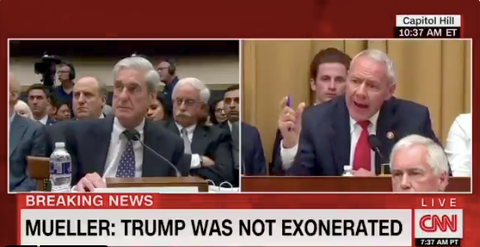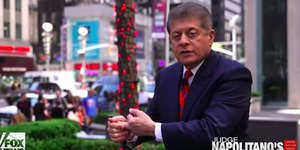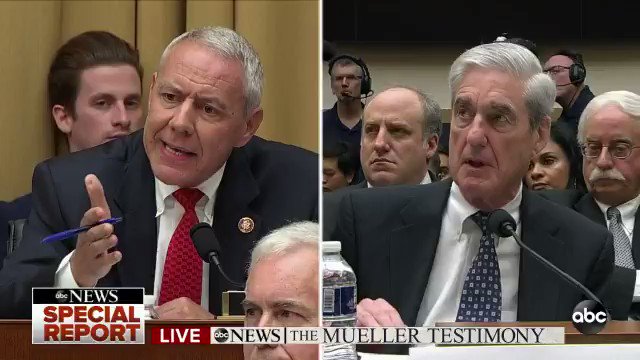Esquire
Robert Mueller Was Pretty Clear Why Trump Wasn’t Charged With Obstruction
Ken Buck even got Mueller to say Trump could be indicted after he leaves office.
By Jack Holmes July 24, 2019

One thing to keep in mind watching former Special Counsel Robert Mueller testify before Congress this fine Wednesday—which primarily consists of him responding, “I would refer you to the report”—is that more than 1,000 former federal prosecutors have signed a letter declaring that, based on the evidence in the Mueller Report, Donald Trump would have been charged with obstruction of justice if he were not the president. The Justice Department’s Office of Legal Counsel has maintained a position that a sitting president cannot be indicted. As a result, the Report does not make a determination either way on whether Trump obstructed justice, but is explicitly clear that it “does not exonerate” the president.
When they weren’t reprising kaleidoscopic rants about Peter Strzok and The Dossier out of the conservative infotainment vortex—hello, Jim Jordan—Republican members of Congress spent their time at Wednesday’s first hearing trying to prove it was wrong of Mueller to compile a report on the president’s misconduct if he knew he could not press charges. It is a breach of traditional prosecutorial procedure to air evidence against an investigation’s subject without indicting them, but the special counsel must produce a report by law, and anyway, we’re talking about the president’s potential criminality around an attack on our democracy here. It’s a matter of public interest.
(Also, Republicans had no problem with it when then-FBI Director James Comey opted not to charge Hillary Clinton over The Emails and The Server, yet dragged her in public, at length, at a press conference.)
Anyway, in the process of trying to impugn Mueller’s ethics, at least one Republican unwittingly laid out the case that Trump would have been indicted if he weren’t the sitting president—that is, if he were any other American—and that he could be indicted if and when he leaves the White House. Step right up, Mr. Buck.
As Buck reminded us, Mueller said explicitly he wasn’t charging Trump with conspiracy because there was insufficient evidence. But he explicitly did not choose to exonerate Trump on obstruction. What explanation is there other than that there was sufficient evidence, but the Justice Department regulations prevent indicting the president?
The president would have been charged with a crime if he were any other person in this country. He could still be charged, assuming he doesn’t make good on his “jokes” about seeking unlimited terms in office. Later, under questioning from Democrat Ted Lieu, Mueller was even more direct.
The president broke the law. He attempted to obstruct an investigation into Russia’s interference in an American presidential election, and whether his campaign conspired in those efforts. (Trump’s campaign was aware of Russia’s influence campaign and that it was intended to help him. They welcomed the meddling, but Mueller found insufficient evidence to charge a criminal conspiracy.) He was not charged because he is the president. It is now the obligation of Congress to hold him accountable, assuming that no one is above the law. That looks more and more like a shaky assumption.
Update (2:14 p.m.): In the second hearing of the day in front of the House Intelligence Committee, Mueller clarified he was not, in fact, saying the Justice Department policy was the only reason he did not charge Trump with obstruction. He did not make a determination either way. But again: if there was insufficient evidence, the Report would have said so, as it did with the conspiracy charge. What other explanation is there?
Jack Holmes is the Politics Editor at Esquire.com, where he writes daily and edits the Politics Blog with Charles P Pierce.


